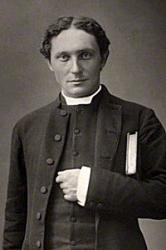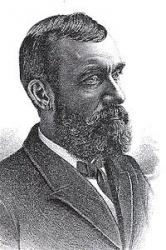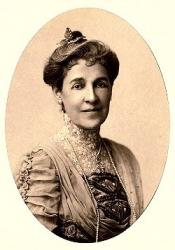Planning worship?
Check out our sister site, ZeteoSearch.org,
for 20+ additional resources related to your search.
- |
User Links
Person Results
Suzanne Bidgrain
1879 - 1961 Translator (French) of "Breathe on me, breath of God" in Cantate Domino
Suzanne Bidgrain
Henry Rosevear
1903 - 2003 Person Name: Henry Rosevear, b.1903 Harmonizer of "DOMINICA" in The Book of Praise
Henry Rosevear
Hanns Lilje
1899 - 1977 Translator (German) of "Breathe on me, breath of God" in Cantate Domino
Hanns Lilje
Stephen Greenleaf Bulfinch

1809 - 1870 Person Name: Stephen G. Bulfinch Author of "Hail to the Sabbath day" in Hymns of the Kingdom of God Bulfinch, Stephen Greenleaf, D.D. This Unitarian minister was born at Boston, June 18, 1809, and removed to Washington in 1818, his father being the architect of the Capitol. He graduated at Columbian College and the Cambridge Theological School. In 1831 lie was ordained at Charleston, S.C., as assistant to Dr. Gilman. Subsequently he was pastor at Pittsburg, Pennsylvania; Washington, 1838; Nashua, New Hampshire, 1845; Dorchester, Mass., 1852; and "East Cambridge, Mass., 1865. He died at the last place, Oct. 12, 1870. His works include:—
(1) Contemplations of the Saviour; A Series of Extracts from the Gospel History, with Reflections and Original and Selected Hymns. Boston, Carter and Hendee, 1832. This has been reprinted in England. (2) Poems, Charleston, S.C., 1834. (3) Lays of the Gospel, 1845. In addition to these works, which contain his original hymns, he also published (4) The Harp and Cross, a selection of hymns, in 1857.
Those of his hymns which have attained ta the greatest popularity are:—
1. Hail to the Sabbath day. Sunday. In the Contemplations, &c, p. 45. It is appended to Sect. xii. on the “Walk through the corn¬fields," and is in 5 stanzas of 4 lines. It is in extensive use both in Great Britain and America, and is the best known of this author'ess hymns. In many collections it begins with st. ii., " Lord, in Thy [this] sacred hour."
2. Hath not thy heart within thee burned? Presence of Christ. In the Contemplations, &c, p. 148, as the accompanying hymn to the Reflections on Jesus appearing to His disciples on their way to Emmaus, It is in 5 stanzas of 4 lines and is given in the Collections of Beard, Martineau, and others in Great Britain.
3. 0 suffering friend of human kind. Passiontide. The hymn in 4 stanzas of 4 lines appended to Sect. xxxv. on "Peter's confession of Christ," in the Contemplations, &c, p. 109. It ranks next in popularity to ”Hail to the Sabbath day."
In addition to these hymns which best represent Dr. Bulfinch's power? as a sacred poet, the following are also in limited use:—
4. Burden of shame and woe. Crucifixion.
5. Holy Son of God most high. Miracles of Christ.
6. How glorious is the hour. The New Life.
7. It is finished! Glorious word. Good Friday.
8. There is a strife we all must wage. Life's Duty. These are from his Poems, 1834. The next—
9. What power unseen by mortal eye. Cure of Nobleman's Son. From the Contemplations, &c, p. 56.
10. In the Saviour's hour of death. Good Friday. Also from the Contemplations, p. 142:
Dr. Bulfinch's hymns were made known to English readers through Beard's Collection, 1837, in which 19 were given. His hymns throughout are noted for solid and tranquil piety, and deserve a wider circulation than has been accorded to them. They embrace some good hymns on the miracles of Christ. [Rev. F. M. Bird, M.A.]
-- John Julian, Dictionary of Hymnology (1907)
====================
Bulfinch, Stephen Greenleaf, p. 191, ii. Several of this authors hymns, not noted in this Dictionary, were given in Longfellow and Johnson's Book of Hymns , 1846-8. Additional hymns by him in English common use are:—
1. Benignant Saviour! 'twas not Thine. The Compassion of Christ . From his Contemplations of the Saviour , &c, 1832. In Horder's Congregational Hymns. 1884, it reads “Most gracious Saviour! 'twas not Thine."
2. We gather to the sacred board. Holy Communion. This in Horder is from Bulfinch's Communion Thoughts, 2nd ed., 1852.
--John Julian, Dictionary of Hymnology, Appendix, Part II (1907)
Stephen Greenleaf Bulfinch
Thomas C. Upham
1799 - 1872 Person Name: Thomas Cogswell Upham Author of "Happy the man who knows" in Christian Science Hymnal (Rev. and enl.) Upham, Thomas Cogswell, D.D., was born at Durfield, New Haven, Jan. 30,1799, and educated at Dartmouth College (1818), and at Andover (1821). Having entered the Congregational Ministry he became Professor of Mental and Moral Philosophy at Bowdon College, in 1825, and retained the same to 1867. He died at New York, April 2, 1872. His publications were numerous and included Mental Philosophy (which was long and widely used); American Cottage Life; a volume of Poems, 1852, &c. Five of his hymns are given, with accompanying dates, in Hymns and Songs of Praise, &c, N. Y., 1874, as follows:—
1. Fear not, poor weary one. Help in Sorrow (1872).
2. Happy the man who knows. Obedience (1872).
3. 0 Thou great Ruler of the sky. Morning (1872).
4. 0 Thou great Teacher from the skies. Following Christ (1872).
5. 'Tis thus in solitude I roam. Omnipresence (1853).
These hymns are limited in their use. In 1847 Upham published the Life and Religious Opinions and Experiences of Madam de la Mothe Guyon. . . Two vols., N. Y. In this work the anonymous translations from Madam Guyon's hymns are found, viz.,
(1) “By sufferings only can we know";
(2) "I would love Thee, God and Father";
(3) "'Tis not [by] the skill of human art." There are also additional translations of two of her hymns in the same work.
--John Julian, Dictionary of Hymnology (1907)
Thomas C. Upham
A. J. Mason

1851 - 1928 Person Name: Arthur James Mason, 1851-1928 Author of "Church of the Living God" in CPWI Hymnal Mason, Arthur James, M.A., was educated at Trinity College, Cambridge; B.A., in honours, 1872. He became a Fellow of his college in 1873, and Assistant Tutor in 1874. Ordained in 1874, he has since held some important appointments, and is now (1891), Hon. Canon and Canon Missioner of Truro, and Vicar of All Hallows, Barking, City of London, 1884, &c. To the 1889 Supplemental Hymns to Hymns Ancient & Modern, he contributed a translation of the Danish hymn: "0 Jesu! søde Jesu, dig" ("0 Jesu, Blessed Lord, to Thee"), Holy Communion, and the following original hymns:—
1. Church of the living God. The Holy Catholic Church.
2. Hail, Body true, of Mary born, and in the manger laid. Holy Communion.
3. Look down upon us, God of grace . Holy Communion.
4. 0 God, to know that Thou art just. Home Missions.
--John Julian, Dictionary of Hymnology, Appendix, Part II (1907)
===================
Mason, A. J., p. 1579, i., son of G. W. Mason, was b. May 4, 1851. Dr. Mason has had a most distinguished career, and has held important appointments in addition to those named on p. 1579, i., including that of Select Preacher at Oxford. In 1895 he became Lady Margaret Professor at Cambridge, and Canon of Canterbury; and in 1903 Master of Pembroke Coll., Cambridge. In addition to other works he published in 1875 The Persecution of Diocletian, and in 1902 Ministry of Conversion. His hymns, noted on p. 1579, i., were retained in the revised edition of Hymns Ancient & Modern, 1904 (Nos. 1, 2, 3, were written about 1886, and 4 in 1874). His hymn on the Seventh Word on the Cross, "The life-long task was done," written in 1902, was also included therein. His translations of the "Salve, festa dies" hymns for Easter, &c, are annotated under their Latin first lines.
--John Julian, Dictionary of Hymnology, New Supplement (1907)
A. J. Mason
Oscar Clute

1837 - 1902 Person Name: O. Clute Author of "O love of God most full" in The American Hymnal for Chapel Service Born: March 11, 1837, Bethlehem (near Albany), New York.
Died: January 27, 1903, Los Angeles, California.
Buried: Los Angeles National Cemetery, Los Angeles, California.
After teaching school (1854-59), Clute graduated from the Michigan Agricultural College, then taught math 1862-66 before studying at Meadville Theological Seminary. He pastored in Vineland and Newark, New Jersey; Keokuk and Iowa City, Iowa; and Pomona, California. He also served as the fourth president of the Michigan Agricultural College (now Michigan State College) (1889-93) and Florida Agricultural College (1893-97). He spent his last years retired in California.
--www.hymntime.com/tch
Oscar Clute
Florence Earle Coates

1850 - 1927 Person Name: Florence E. Coates Author of "Thou That Dost Save Through Pain" in The Cyber Hymnal Florence Van Leer Earle Nicholson Coates (July 1, 1850 – April 6, 1927) was an American poet.
She was born in Philadelphia, Pennsylvania. Granddaughter of noted abolitionist and philanthropist Thomas Earle, and eldest daughter of Philadelphia lawyer George H. Earle, Sr. and Mrs. Frances ("Fanny") Van Leer Earle, Mrs. Coates gained notoriety both at home and abroad for her works of poetry—nearly three-hundred of which were published in literary magazines such as the Atlantic Monthly, Scribner's Magazine, The Literary Digest, Lippincott's, The Century Magazine, and Harper's. Many of her poems were set to music by composers such as Mrs. H. H. A. Beach (Amy Cheney Beach), Clayton Johns, and Charles Gilbert Spross. She attended school in Lexington, Massachusetts sometime between 1864 and 1867 under the instruction of abolitionist and teacher Theodore Dwight Weld, who had "charge of Conversation, Composition, and English Literature," and would further her education abroad at the Convent of the Sacred Heart in Paris (Rue de Varenne), and by studying music in Brussels under noted instructors of the day.
Literary and social critic Matthew Arnold both encouraged and inspired Mrs. Coates' writing of poetry. He was a guest at the Coates' Germantown home when his lecture tours brought him to Philadelphia. Coates and Arnold first met in New York—during Arnold's first visit and lecture tour of America—at the home of Andrew Carnegie, "where they formed a lasting friendship." The tour (which lasted from October 1883 to March 1884) brought Arnold to Philadelphia in December 1883, where he lectured at Association Hall on the topics of the "Doctrine of the Remnant" and on "Emerson." His second visit and tour of America took place in 1886, and brought him to Philadelphia in early June where he was again hosted by Mr. and Mrs. Coates and spoke on the topic of "Foreign Education" at the University of Pennsylvania chapel. Arnold wrote to Mrs. Coates in 1887 and 1888 from his home at Pains Hill Cottage in Cobham, Surrey, England describing his remembrance of and fondness for her "tulip-trees and maples." Rarely did Mrs. Coates write or publish prose work, but in April 1894 and again in December 1909, she dedicated her pen to remembrances of her mentor in issues of the Century and Lippincott's magazines respectively.
The Coates' often spent their summer months in the Adirondacks, where they maintained "Camp Elsinore"—their summer camp by the Upper St. Regis Lake. It was there that they entertained, rested and escaped the humidity of Philadelphia summers. In the early 1900s (decade), the Coates' seasonally opened their camp to Anna Roosevelt Cowles ("Bamie")—elder sister of Theodore Roosevelt. Among Mrs. Cowles' visitors during her stays at Elsinore was Alice Roosevelt, President Theodore Roosevelt's daughter. Many of Mrs. Coates' nature poems were inspired by the flora and fauna of the Adirondacks.
In the March 1913 issue of Lippincott's Monthly Magazine, noted anthologist and poet, William Stanley Braithwaite (1878–1962), gives a detailed 9-page review of Mrs. Coates' poetry, relating how "she draws from the Olympian world figures that typify some motive or desire in human conduct, and in the modern world the praise of men and women, heroic in attainment or sacrifice; or laments events that effect social and ethical progress, showing how beneficently she has brought her art, without modifying in the least its abstract function as a creator of beauty and pleasure, into the service of profound and vital problems." Much of Mrs. Coates' later published work was written during the years spanning World War I and showcased her concern for such "profound and vital problems" as her voice joined the chorus of 'singers' in support of American involvement in the war—evidenced in her privately published pamphlet of war poetry, Pro Patria (1917). Mrs. Coates also penned several other works of fugitive verse, much of which is patriotic and war-related, describing the selfless sacrifices made by soldiers and citizens alike for the cause of freedom and liberty.
Florence was a founder of the Contemporary Club of Philadelphia in 1886; one of twenty founders of the Society of Mayflower Descendants in the Commonwealth of Pennsylvania in 1896—herself being a ninth generation descendant of Pilgrim John Howland; and twice president of the Browning Society of Philadelphia from 1895 to 1903, and again from 1907 to 1908. In 1915, Florence was unanimously elected poet laureate of Pennsylvania by the state's Federation of Women's Clubs.
She married first, William Nicholson—who died in 1877 after only five years of marriage. On 7 January 1879, she married Edward Hornor Coates at Christ Church in Philadelphia. Mr. Coates would eventually adopt Florence's daughter from her first marriage—Alice Earle Nicholson. Florence and Edward had one child together in 1881, but the baby—Josephine Wisner Coates—died in infancy. Mr. Coates was president of the Pennsylvania Academy of the Fine Arts from 1890 to 1906. He died on 23 December 1921. In 1923, Mrs. Coates presented The Edward H. Coates Memorial Collection to the Pennsylvania Academy of the Fine Arts in Philadelphia. The exhibition included 27 paintings and 3 pieces of sculpture, and was displayed from 4 November 1923 to 10 January 1924. Florence died at Hahnemann Hospital in Philadelphia on 6 April 1927. She is buried at the Church of the Redeemer churchyard in Bryn Mawr, Pennsylvania alongside her husband and her brother George Howard Earle, Jr. and many of his descendants, including his son, former Pennsylvania Governor, George Howard Earle III—Florence's nephew.
--en.wikipedia.org/wiki/
Florence Earle Coates
Samuel Johnson

1822 - 1882 Author of "God of the earnest heart" in Hymns of Worship and Service Johnson, Samuel, M.A, was born at Salem, Massachusetts, Oct. 10, 1822, and educated at Harvard, where he graduated in Arts in 1842, and in Theology in 1846. In 1853 he formed a Free Church in Lynn, Massachusetts, and remained its pastor to 1870. Although never directly connected with any religious denomination, he was mainly associated in the public mind with the Unitarians. He was joint editor with S. Longfellow (q. v.) of A Book of Hymns for Public and Private Devotion, Boston, 1846; the Supplement to the same, 1848; and Hymns of the Spirit, 1864. His contributions to these collections were less numerous than those by S. Longfellow, but not less meritorious. He died at North Andover, Massachusetts, Feb. 19, 1882. His hymns were thus contributed:—
i. To A Book of Hymns, 1846.
1. Father [Saviour] in Thy mysterious presence kneeling. Divine Worship.
2. Go, preach the gospel in my name. Ordination.
3. Lord, once our faith in man no fear could move. In Time of War.
4. O God, Thy children gathered here. Ordination.
5. Onward, Christians, [onward] through the region. Conflict. In the Hymns of the Spirit, 1864, it was altered to "Onward, onward through the region."
6. Thy servants' sandals, Lord, are wet. Ordination.
7. When from Jordan's gleaming wave. Holy Baptism.
ii. To the Supplement, 1848.
8. God of the earnest heart. Trust.
iii. To the Hymns of the Spirit, 1864.
9. City of God, how broad, how far. The Church the City of God.
10. I bless Thee, Lord, for sorrows sent. Affliction— Perfect through suffering.
11. Life of Ages, richly poured. Inspiration.
12. Strong-souled Reformer, Whose far-seeing faith. Power of Jesus.
13. The Will Divine that woke a waiting time. St. Paul.
14. Thou Whose glad summer yields. Prayer for the Church.
15. To light that shines in stars and souls. Dedication of a Place of Worship.
Of these hymns No. 8 was "Written for the Graduating Exercises of the Class of 1846; in Cambridge Divinity Schools ; and No. 10 “Written at the request of Dorothea L. Dix for a collection made by her for the use of an asylum." It is undated. A few only of these hymns are in use in Great Britain. [Rev. F. M. Bird, M.A.]
-- John Julian, Dictionary of Hymnology (1907)
Samuel Johnson


 My Starred Hymns
My Starred Hymns

